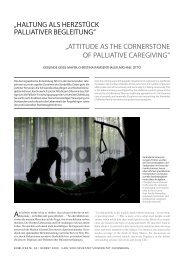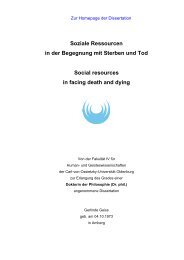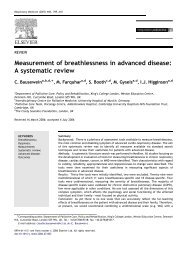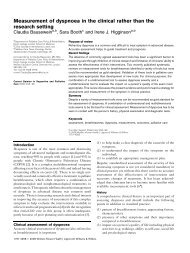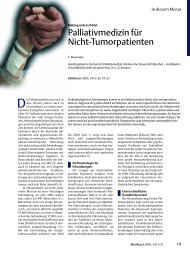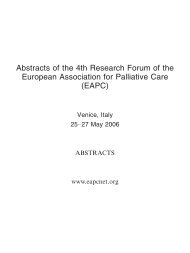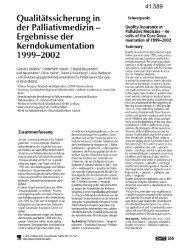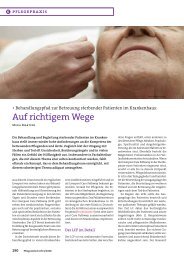EAPC - ipac
EAPC - ipac
EAPC - ipac
Create successful ePaper yourself
Turn your PDF publications into a flip-book with our unique Google optimized e-Paper software.
438 <strong>EAPC</strong> Abstracts<br />
competently within the limits of current care. They showed that adequate<br />
self-management requires a constellation of skills and behaviours. They<br />
were involved in pulmonary rehabilitation and had adopted this as a way of<br />
life. Benefits and challenges to participation in these programmes were<br />
identified. Conclusions: A minority of patients practiced self-management<br />
and maintained an acceptable quality of life through self-acquired expertise<br />
relating to symptoms, medication and help-seeking. Well-being needed to<br />
be understood, not as the end point but as a precarious balance, needing<br />
skillful maintenance and hard work. The findings have implications for<br />
adherence, patient-involvement, and responsibility in the management of<br />
COPD.<br />
129 Oral Presentation<br />
Other symptoms: Respiratory, Cognitive and Cachexia<br />
Sympathetic nervous system activity in patients with cancer: a<br />
pilot study<br />
Authors: Ashika Sequeira Faculty of Medicine and Health Sciences<br />
University of Nottingham UNITED KINGDOM<br />
Alpna Chauhan Hayward House Macmillan Specialist Palliative Care Unit,<br />
Nottingham University Hospitals NHS Trust Nottingham UNITED<br />
KINGDOM<br />
Cathann Manderson Hayward House Macmillan Specialist Palliative Care<br />
Unit, Nottingham University Hospitals NHS Trust Nottingham UNITED<br />
KINGDOM<br />
David Wasley University of Wales Cardiff UNITED KINGDOM<br />
Andrew Wilcock University of Nottingham Nottingham UNITED<br />
KINGDOM<br />
Background: Overactivity of the sympathetic nervous system (SNS) promotes<br />
catabolism and may contribute to cachexia in chronic heart failure<br />
and COPD. This study examined for evidence of SNS overactivity in<br />
patients with cancer cachexia. Methods: Patients with weight loss of more<br />
than 5% since diagnosis and age-matched healthy controls were studied.<br />
Those with conditions or taking drugs known to impact the SNS, hypothalamic-pituitary-adrenal<br />
axis or the measurement of heart rate variability<br />
(HRV) were excluded. A 5min ECG recording was taken under controlled<br />
breathing conditions. HRV was analysed by power spectral analysis (Chart<br />
software v5.5.4, AD Instruments, Oxford, UK). Mean values of serum cortisol<br />
and urinary catecholamines/metanephrines were calculated from two<br />
consecutive 9am blood samples and 24h urine collections respectively.<br />
Differences were analysed using the Mann-Whitney U test. Results:<br />
9 patients with a mean (SD) age of 59 (13) years, percentage weight loss of<br />
17 (12) and an ECOG performance status of 0–3 were recruited along with<br />
9 healthy controls. Heart rate did not differ between the groups. Compared<br />
to the control group, all seven aspects of HRV assessed were lower in the<br />
patient group, four significantly so (table). Serum cortisol, urinary catecholamines<br />
or metanephrines did not differ significantly. HRV component<br />
(ms2) Median (range) P value Patients Controls Total power 336 (63–545)<br />
902 (411–3999) 0.001 High frequency 78 (5–246) 313 (67–809) 0.030 Low<br />
frequency 62 (13–136) 328 (95–1914) 0.004 Very low frequency 156<br />
(28–295) 336 (153–1209) 0.012. Conclusions: Our results do not suggest<br />
overactivity of the SNS in this group of patients. However, there is evidence<br />
of a global reduction of autonomic modulation of cardiovascular tone with<br />
impaired sympathetic and parasympathetic components. Possible explanations<br />
include deconditioning and paraneoplastic neuropathy.<br />
130 Oral Presentation<br />
Other symptoms: Respiratory, Cognitive and Cachexia<br />
Modafinil for cognitive dysfunction in advanced cancer:<br />
A double-blind, randomized, cross-over, placebo-controlled trial<br />
Authors: Lena Lundorff Department of Palliative Care Regions Hospitalet<br />
Herning DENMARK<br />
Birte Jønsson Regions hospitalet Herning Herning DENMARK<br />
Per Sjøgren Multidisciplinary Pain Centre Copenhagen DENMARK<br />
Background: Aim: To evaluate the effectiveness of single-dose Modafinil<br />
compared with placebo in advanced cancer patients on cognitive function<br />
Methods: Twenty-eight cancer patients with a fatigue score of 50 mm or<br />
more on the Edmonton Symptom Assessment System (ESAS),<br />
Hgb > 6,5mmol/l, creatinine< 150 mmol/l, total se-Ca < 2,7 mmol/l and<br />
Karnofsky Performance Status 40–70 were included. All medications were<br />
kept stable one week before and during the trial, however, the patients were<br />
allowed to use supplemental doses of short acting opioids for breakthrough<br />
pain. On day 1 the patients were randomly assigned to receive 200 mg<br />
Modafinil orally or placebo and on day 4 crossed-over to the alternative<br />
treatment. Finger Tapping Test (FTT), Trail Making Test (TMT) and ESAS<br />
were evaluated before tablet intake and again 4,5 hours after. Side effects<br />
were registered. Statistics: Wilcoxon signed rank test. Values of p



